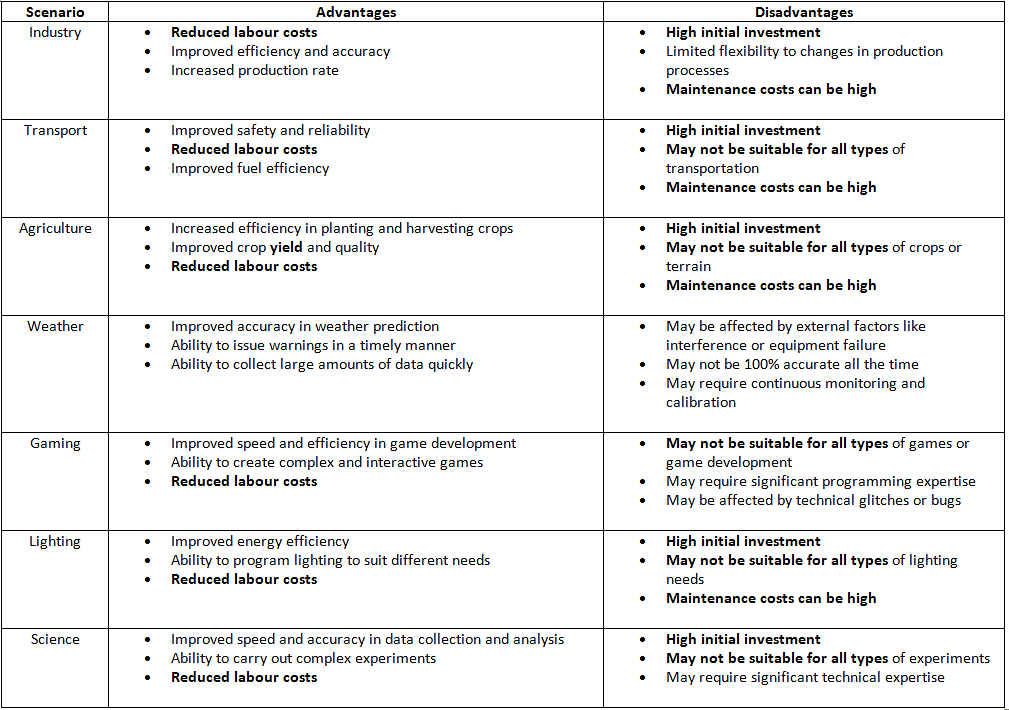Class 10 Exam > Class 10 Notes > Computer for GCSE/IGCSE > Automated Systems
Automated Systems | Computer for GCSE/IGCSE - Class 10 PDF Download
Automated Systems
Automated systems: Sensors, microprocessors, and actuators work together for automation.
- Sensors in Automated Systems: Sensors play a crucial role in automated systems by detecting changes in the environment.They convert these changes into electrical signals for processing by a microprocessor. For example, temperature sensors in a smart thermostat detect room temperature fluctuations.
- Microprocessors' Functionality: Microprocessors analyze signals received from sensors and make decisions based on preset instructions. These decisions drive the actions performed by the system. For instance, in a self-driving car, the microprocessor processes data to control steering and acceleration.
- Actuators and Their Role: Actuators receive signals from the microprocessor and execute physical actions, such as moving parts or devices. They translate digital commands into mechanical movements within the system. For instance, actuators in a robotic arm enable precise movements for manufacturing tasks.
Integration of Components: When sensors, microprocessors, and actuators are combined, automated systems are created. These systems can autonomously respond to environmental changes without human intervention. For example, in a home security system, sensors detect motion, the microprocessor analyzes data, and actuators trigger alarms.
Question for Automated SystemsTry yourself: What is the role of sensors in automated systems?View Solution
Here are some scenarios where automated systems are used:

The document Automated Systems | Computer for GCSE/IGCSE - Class 10 is a part of the Class 10 Course Computer for GCSE/IGCSE.
All you need of Class 10 at this link: Class 10
|
99 docs|31 tests
|
FAQs on Automated Systems - Computer for GCSE/IGCSE - Class 10
| 1. What are automated systems in the context of a theme park game? |  |
Ans. Automated systems in a theme park game refer to the technology and machinery used to control various aspects of the game, such as ride operations, ticketing systems, and game mechanics, without the need for constant human intervention.
| 2. How do automated systems enhance the overall experience in a theme park game? |  |
Ans. Automated systems in a theme park game help streamline operations, reduce human error, improve efficiency, and provide a more seamless and enjoyable experience for players by ensuring smooth gameplay and consistent performance.
| 3. What are some examples of automated systems commonly used in theme park games? |  |
Ans. Examples of automated systems in theme park games include ride control systems, ticketing kiosks, interactive displays, audio-animatronics, and lighting effects, all of which work together to create an immersive and engaging gaming experience.
| 4. How do automated systems contribute to the safety and security of theme park games? |  |
Ans. Automated systems in theme park games are designed to monitor and regulate various safety protocols, such as ride maintenance schedules, emergency shutdown procedures, and crowd control measures, to ensure the well-being of players and staff.
| 5. What are the potential challenges associated with implementing and maintaining automated systems in theme park games? |  |
Ans. Challenges may include initial setup costs, technical glitches, software updates, cybersecurity risks, and the need for trained personnel to troubleshoot and maintain the automated systems to ensure uninterrupted gameplay.
Related Searches




















